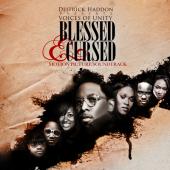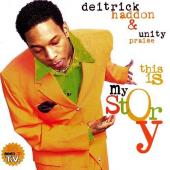No albums list this artist in credits. You are able to edit albums and add credit info if you have created an account.
Deitrick Haddon is a Gospel singer, songwriter and producer. An extremely popular artist known for his contemporary style of music, he is well known for his progressive gospel styles.
Emerging from the highly competitive gospel scene in Detroit, Michigan, with its numerous and skillful traditional choirs, Deitrick Haddon has made his mark in progressive gospel styles. Drawing on a range of secular music that extended from classic soul to hiphop, Haddon made a point of using his music as a ministry to the unchurched. Yet his forward-looking style didn't involve any compromises when it came to the expression of faith; Haddon's music was passionate in its devotional spirit, and in performance he interspersed his songs with spoken, sermon-like material. By the mid-2000s, Haddon was contending for the gospel world's top awards.
Haddon's bent toward sermonizing came naturally. Born around 1973 in Detroit, he was the son of Bishop Clarence Haddon, pastor at the Unity Cathedral of Faith, a Full Gospel church on the city's west side. Haddon's mother Joyce also became a minister. Bishop Haddon used music to attract and to help focus the lives of young people in the troubled neighborhood, organizing Trinidadian steel drum classes at the church and incorporating the instruments into church services. But Unity Cathedral also had a choir, and Deitrick was soon enlisted to direct it.
Actually, Haddon started preaching before he turned to music. Showing a gift for holding the attention of a crowd, he gave his first sermon at age 11. Soon his mother encouraged him to take solos with Unity Cathedral's 60-voice adult choir. Haddon was reluctant at first. "I'd be crying while I was singing," he told an interviewer from the Kay 3 Music Web site. "I was shy back in the day and I hated to sing. But they [his parents] pushed me to do it. Sometimes I'd be sleeping and my friends would wake me up and say, hey D.D., they callin' you to do a solo." Two years later, the church's regular choir director resigned; and young Haddon was appointed one of two choir directors.
Haddon would remain in his choir director post for over 15 years, until moving to Florida with his wife in the mid-2000s. He also served as Unity's assistant pastor. The choir took on the name Voices of Unity and became known beyond Detroit. Unity Cathedral itself grew and opened a branch in the Detroit suburb of Inkster. With such local stars as the Clark Sisters and the entire Winans family gaining national exposure and even crossing over to secular audiences, the chances of an unknown Detroiter breaking into the scene might have seemed slim. But the challenge of having famous neighbors, Haddon said, only motivated him. "I believe that if Commissioned, [and] The Clark Sisters can come out of Detroit and represent, then I can do it too," he told Kay 3 Music.
Signed to the small Tyscot label in 1994, Haddon and Voices of Unity issued the album Come into This House the following year. Live the Life, released in 1997, began to put Haddon on the gospel music map as it won two Gospel Music Workshop of America awards, one for New Artist of the Year: Urban Contemporary and the other for Album of the Year: Urban Contemporary. Proclaiming influences from Pastor Marvin Winans, gospel vocalist Rance Allen, and such secular stars as Stevie Wonder, Donnie Hathaway, Sam Cooke, and even Michael Jackson, Haddon created a sound that he at first dubbed "gospel soul."
Though he continued to use choral elements in his music, Haddon's 1998 album This Is My Story was issued under his own name, as a solo release. By 1999, when Haddon released Chain Breaker, he had added more new elements to the musical mix. The album featured contributions by gospel choir leader John P. Kee. "Haddon splashes his boundless imagination and eclecticism across a canvas of riveting, righteous R&B and hip-hop, with bold brushstrokes of everything from arena rock and funk to wildly original, new-millennial church choir…. This is the stuff entire trends are made of," raved Billboard's Paul Verna.
Indeed, Haddon and his wife Damita, a gospel singer and former member of the group Adoration 'n' Praise, took steps to bring large numbers of young Detroiters into his unique gospel vision: the album Nu Hymnz: Live from the Motor City, released in 2000, featured a chorus of more than 300 Detroit singers. The performances heard on the album were also released as a movie, Deitrick Haddon: Nu Hymnz—Sing a Nu Song. Larger players in the gospel industry began to take note of Haddon's success, and he was signed to the Verity label. Haddon didn't cut his ties with the small label that had given him his start; when Lost & Found was released in late 2002, it bore the label imprints of both Verity and Tyscot.
Lost & Found was Deitrick Haddon's breakthrough album. With its funky, partly rapped hit single "Oh Yeah," Haddon concocted a state-of-the-art, big-beat, hip-hop-influenced sound that still left room for traditional call-and-response between leader and congregation ("If Jesus Christ is runnin; your life, say 'Oh yeah!'"). Haddon was sometimes compared with the similarly eclectic gospel singer Tonex, and like that California-based artist he tried to head off criticism from those who might feel his style was too secular. "Someone who doesn't know Jesus can listen to this and relate," he told the Kay 3 Music Web site. "A lot of times we tend to be self-righteous in our approach and we alienate people who don't know."
The slow, soulful "Sinner's Prayer" became another hit from Lost & Found, and the album cracked the top ten of Billboard magazine's gospel albums chart and the top 20 of its contemporary Christian albums chart. Haddon garnered a Grammy award nomination for Best Contemporary Soul Gospel Album and picked up several of the gospel industry's Stellar award nominations. Crossroads, the 2004 follow-up to Lost & Found, featured the same mix of styles as did its predecessor and sold even better: Haddon enjoyed his first number-one gospel recording and made the top 40 of Billboard's top R&B/Hip-Hop albums chart. A collection of Haddon's earlier material was issued by Tyscot under the title Just the Hits in 2005.
Deitrick Haddon's sense of clothing style matched his musical originality. At a 2004 concert at Virginia's Old Dominion University, reported Deanne M. Bradley of the Virginian Pilot, "the new-era gospel music soul prodigy sprinted onto the stage dressed in indigo jeans and a matching jacket." "I feel like having church in here! I dare you to praise Him in here tonight," Haddon exclaimed to the same Virginia crowd. As he looked toward the mature phase of his career, Haddon seemed to be the artist who could combine contemporary musical styles with a hard-core gospel message.











